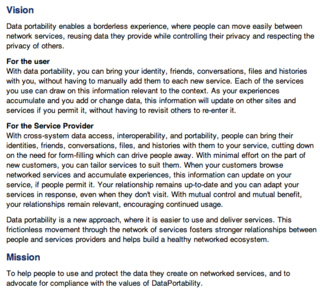Yesterday Facebook announced that its has reached the 350 million users mark. No doubt, the figure is impressive, and the masses are with Facebook. Looks like smooth sailing. But certainly, there has been some severe white water rafting, too. The main hurdles? The users’ privacy.
Over the past weeks I have been following with interest the most recent movements that some leading online companies have done in the privacy space. We probably all remember how Facebook failed to change its terms of use in February, when it tried to persuade the users that their data would stay with Facebook even if the owner decided to delete its Facebook profile. Response against this move was inmense, and Facebook had to correct. Interestingly, this failed episode probably has kicked off the increasing privacy debate that has been going on over the past months. Users all over the world have been showing more and more concern about their data, and what leading online companies have been using with them. This, in turn, is forcing companies to react, which often implies a public statement (or even more) of respect of the user’s privacy. Which should be obvious, but in the past some sort of ambiguity was enough to distract mistrusting users.blogpost on LinkedIn from February 2008 is interesting, since the company defends (already then!) data portability. This is interesting, since most social networking sites live from the lock-in they create by “owning the users data – which means, by creating switching costs that make it costly for the user to move from one site to the next. Data portability implies that I can decide to withdraw my data and take it with me to the next site at no cost (or effort). Actually, the dataportability project has been around for some time now, and its worthwhile to keep in mind its vision and mission (Source: www.datportability.org):
To be clear, some companies have made clear statements about privacy already in the past. In this sense, a
 A closer look at LinkedIn reveals that its privacy policy has had its ups and downs (from starting with a business model in which only people within 3 grades could see my profile, to one in which by paying everybody can see it). But, as another more recent post says, privacy (and security) is a serious matter.Dashboard, a sort of balance scorecard of the information that Google has about me. Next, Mark Zuckerberg from Facebook has issued two days ago one of his rare open letters explaining that the company is introducing a series of changes that imply an increased control by me of my privacy at the site. This is especially interesting since a past announcement in July was indicating that the site would open rather than close my control over my profile (basically, it was about increasing visibility to “everyone” – probably a thought at that time to prevent Twitter from becoming more and more powerful…). Finally, the implementation path that Facebook has chosen is the opposite, and hence we get increased control over our own privacy. Good news, no doubt.—–
A closer look at LinkedIn reveals that its privacy policy has had its ups and downs (from starting with a business model in which only people within 3 grades could see my profile, to one in which by paying everybody can see it). But, as another more recent post says, privacy (and security) is a serious matter.Dashboard, a sort of balance scorecard of the information that Google has about me. Next, Mark Zuckerberg from Facebook has issued two days ago one of his rare open letters explaining that the company is introducing a series of changes that imply an increased control by me of my privacy at the site. This is especially interesting since a past announcement in July was indicating that the site would open rather than close my control over my profile (basically, it was about increasing visibility to “everyone” – probably a thought at that time to prevent Twitter from becoming more and more powerful…). Finally, the implementation path that Facebook has chosen is the opposite, and hence we get increased control over our own privacy. Good news, no doubt.—–
This concern is going mainstream. In the past month Google has introduced
These are just two (albeit very visible) examples of many many moves. And one might wonder if a snowball effect is already happening, and if this will extend to other parts of the web, too. Especially interesting is that of the “privacy” of content owners. In this sense, we’ve seen Rupert Murdoch’s News Corp achieving an exclusive deal with Microsoft’s Bing search engine. And just today Google announced a new news crawler which gives publishers more control over news crawling. This is again, good news for the hardly hit pulishing industries, no dout. Let’s continue watching.

